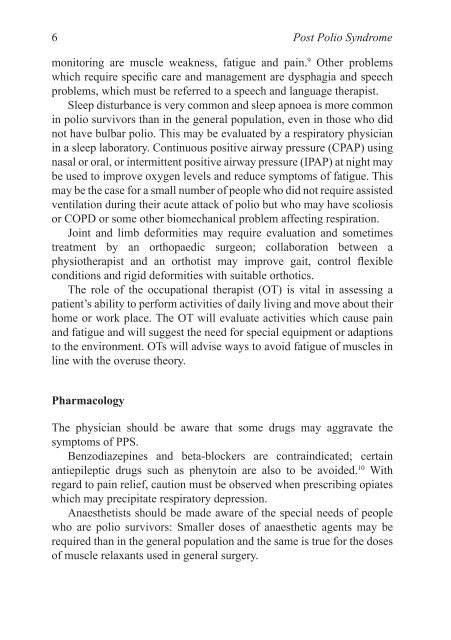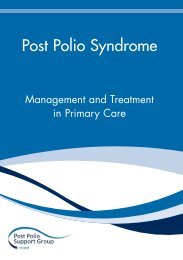Post Polio Syndrome - Management & Treatment in Primary
Post Polio Syndrome - Management & Treatment in Primary
Post Polio Syndrome - Management & Treatment in Primary
You also want an ePaper? Increase the reach of your titles
YUMPU automatically turns print PDFs into web optimized ePapers that Google loves.
6 <strong>Post</strong> <strong>Polio</strong> <strong>Syndrome</strong><br />
monitor<strong>in</strong>g are muscle weakness, fatigue and pa<strong>in</strong>. 9 Other problems<br />
which require specific care and management are dysphagia and speech<br />
problems, which must be referred to a speech and language therapist.<br />
Sleep disturbance is very common and sleep apnoea is more common<br />
<strong>in</strong> polio survivors than <strong>in</strong> the general population, even <strong>in</strong> those who did<br />
not have bulbar polio. This may be evaluated by a respiratory physician<br />
<strong>in</strong> a sleep laboratory. Cont<strong>in</strong>uous positive airway pressure (CPAP) us<strong>in</strong>g<br />
nasal or oral, or <strong>in</strong>termittent positive airway pressure (IPAP) at night may<br />
be used to improve oxygen levels and reduce symptoms of fatigue. This<br />
may be the case for a small number of people who did not require assisted<br />
ventilation dur<strong>in</strong>g their acute attack of polio but who may have scoliosis<br />
or COPD or some other biomechanical problem affect<strong>in</strong>g respiration.<br />
Jo<strong>in</strong>t and limb deformities may require evaluation and sometimes<br />
treatment by an orthopaedic surgeon; collaboration between a<br />
physiotherapist and an orthotist may improve gait, control flexible<br />
conditions and rigid deformities with suitable orthotics.<br />
The role of the occupational therapist (OT) is vital <strong>in</strong> assess<strong>in</strong>g a<br />
patient’s ability to perform activities of daily liv<strong>in</strong>g and move about their<br />
home or work place. The OT will evaluate activities which cause pa<strong>in</strong><br />
and fatigue and will suggest the need for special equipment or adaptions<br />
to the environment. OTs will advise ways to avoid fatigue of muscles <strong>in</strong><br />
l<strong>in</strong>e with the overuse theory.<br />
Pharmacology<br />
The physician should be aware that some drugs may aggravate the<br />
symptoms of PPS.<br />
Benzodiazep<strong>in</strong>es and beta-blockers are contra<strong>in</strong>dicated; certa<strong>in</strong><br />
antiepileptic drugs such as phenyto<strong>in</strong> are also to be avoided. 10 With<br />
regard to pa<strong>in</strong> relief, caution must be observed when prescrib<strong>in</strong>g opiates<br />
which may precipitate respiratory depression.<br />
Anaesthetists should be made aware of the special needs of people<br />
who are polio survivors: Smaller doses of anaesthetic agents may be<br />
required than <strong>in</strong> the general population and the same is true for the doses<br />
of muscle relaxants used <strong>in</strong> general surgery.<br />
PPS Mngt and Treat.<strong>in</strong>db 6 02/07/2007 16:07:49





